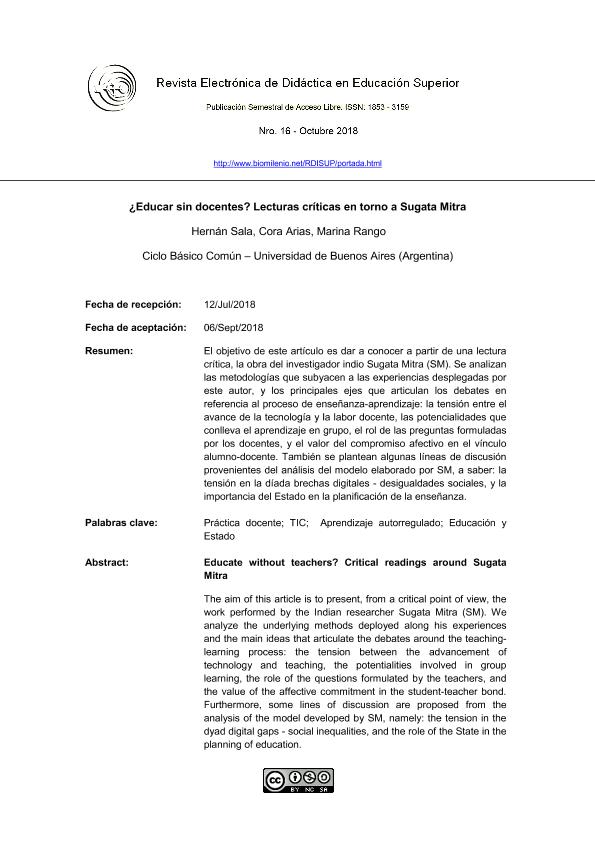Mostrar el registro sencillo del ítem
dc.contributor.author
Sala, Hernán
dc.contributor.author
Arias, Cora Cecilia

dc.contributor.author
Rango, Marina
dc.date.available
2020-02-17T21:29:53Z
dc.date.issued
2018-10
dc.identifier.citation
Sala, Hernán; Arias, Cora Cecilia; Rango, Marina; ¿Educar sin docentes?: Lecturas críticas en torno a Sugata Mitra; Universidad de Buenos Aires. Ciclo Básico Común; Revista Electrónica de Didáctica en Educación Superior; 16; 10-2018; 1-22
dc.identifier.issn
1853-3159
dc.identifier.uri
http://hdl.handle.net/11336/97848
dc.description.abstract
El objetivo de este artículo es dar a conocer a partir de una lectura crítica, la obra del investigador indio Sugata Mitra (SM). Se analizan las metodologías que subyacen a las experiencias desplegadas por este autor, y los principales ejes que articulan los debates en referencia al proceso de enseñanza-aprendizaje: la tensión entre el avance de la tecnología y la labor docente, las potencialidades que conlleva el aprendizaje en grupo, el rol de las preguntas formuladas por los docentes, y el valor del compromiso afectivo en el vínculo alumno-docente. También se plantean algunas líneas de discusión provenientes del análisis del modelo elaborado por SM, a saber: la tensión en la díada brechas digitales - desigualdades sociales, y la importancia del Estado en la planificación de la enseñanza.
dc.description.abstract
The aim of this article is to present, from a critical point of view, the work performed by the Indian researcher Sugata Mitra (SM). We analyze the underlying methods deployed along his experiences and the main ideas that articulate the debates around the teaching-learning process: the tension between the advancement of technology and teaching, the potentialities involved in group learning, the role of the questions formulated by the teachers, and the value of the affective commitment in the student-teacher bond. Furthermore, some lines of discussion are proposed from the analysis of the model developed by SM, namely: the tension in the dyad digital gaps - social inequalities, and the role of the State in the planning of education.
dc.format
application/pdf
dc.language.iso
spa
dc.publisher
Universidad de Buenos Aires. Ciclo Básico Común
dc.rights
info:eu-repo/semantics/openAccess
dc.rights.uri
https://creativecommons.org/licenses/by-nc-sa/2.5/ar/
dc.subject
PRÁCTICA DOCENTE
dc.subject
TECNOLOGÍAS DE LA INFORMACIÓN Y DE LA COMUNICACIÓN
dc.subject
APRENDIZAJE AUTORREGULADO
dc.subject
EDUCACIÓN Y ESTADO
dc.subject.classification
Ciencias Sociales Interdisciplinarias

dc.subject.classification
Otras Ciencias Sociales

dc.subject.classification
CIENCIAS SOCIALES

dc.title
¿Educar sin docentes?: Lecturas críticas en torno a Sugata Mitra
dc.title
Educate without teachers?: Critical readings around Sugata Mitra
dc.type
info:eu-repo/semantics/article
dc.type
info:ar-repo/semantics/artículo
dc.type
info:eu-repo/semantics/publishedVersion
dc.date.updated
2019-10-28T19:54:33Z
dc.journal.number
16
dc.journal.pagination
1-22
dc.journal.pais
Argentina

dc.journal.ciudad
Ciudad Autónoma de Buenos Aires
dc.description.fil
Fil: Sala, Hernán. Universidad de Buenos Aires. Ciclo Básico Común; Argentina
dc.description.fil
Fil: Arias, Cora Cecilia. Consejo Nacional de Investigaciones Científicas y Técnicas; Argentina. Universidad de Buenos Aires. Ciclo Básico Común; Argentina
dc.description.fil
Fil: Rango, Marina. Universidad de Buenos Aires. Ciclo Básico Común; Argentina
dc.journal.title
Revista Electrónica de Didáctica en Educación Superior
dc.relation.alternativeid
info:eu-repo/semantics/altIdentifier/url/http://ojs.cbc.uba.ar/index.php/redes/article/view/26
Archivos asociados
